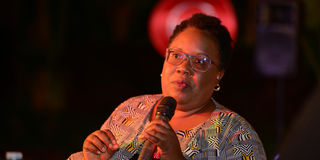Prime
Women’s participation in economic activities key in empowerment – Nkutu

Sophie Nkuutu addresses guests during an engagement in December 2022. Photo/Courtesy
What you need to know:
Sophie Nkuutu urges women to look out for programmes designed specifically to support, train and improve women-led businesses. Both governmental and non-governmental agencies, such as Uganda Women Enterprenuers Association Limited, Private Sector Foundation Uganda, and Mastercard Foundation has opportunities for women.
Sophie Nkuutu is an accountant, entrepreneur and a consultant. She is currently a member of the board of governors of Absa bank. Over the years, she has spearheaded significant information technology driven projects such as the implementation of core banking, accounting, payroll and practice management systems. She has also led large-scale transformation projects in sectors including banking, telecommunications, insurance and professional services. In this interview, she shares tips of how to access financial services to jumpstart startups and why increasing women’s participation in economic activities is important for the economy.
In your view, what role does women’s empowerment play in increasing women’s participation in economic activities?
Empowerment certainly impacts economic activity and strongly impacts education, culture and values, healthcare, and environmental sustainability. A society that is healthy, well-educated, mindful of its environment, and with well-grounded values and ethics thrives and prospers.
Women are critica lin ensuring a sustainable future for this generation and the next. Women are more patient, often more resilient in business and tend to take a longer-term view
Uganda is a highly entrepreneurial country. SMEs comprise about 90 percent of the private sector and contribute 75 percent of GDP, employing over 2.5 million people.
A World Bank report cites that SMEs created 50 percent of new jobs in the last five years. It is estimated that around 1/3 of these SMEs are owned by women. Women are, therefore, already participating actively in the economy. The question that comes to mind is,what role does women’s participation in economic activity play in increasing women’s empowerment? I believe there is an opportunity for women to come together in more organised and intentional ways to leverage the benefits.
Based on your experience, what essential skills and competencies do women need to earn more, both as employees and as entrepreneurs?
It starts with our mindset. Our paradigm. The lens through which we perceive the world. A quote by Dr Wayne Dyer says, “when you change the way you look at things, the things you look at change.”
As women, we need to believe in ourselves and trust that we can achieve anything we put our hearts to. The belief among many women that they need permission, a go-ahead, and validation from someone else to be the best they can be needs to debunked. We need to shift this perception and trust ourselves to get on and do it without waiting for permission.
As women, we also need to show up and deliver our best every time we are assigned to do something. The second is to be proactive. To consciously make choices and decisions that determine our outcome rather than leave things to fate and circumstance.
In the Seven Habits of Highly Effective People, Dr Stephen Covey says 10 percent of our outcome is determined by what happens to us, and 90 percent is determined by how we respond to it.
There is a space between the stimulus – the thing, the event, the circumstance - that happens to us and our response. In that space lies choice.
We have the power to choose how we respond to what happens to us. We must make choices based on our values and principles, not emotions. We have the response-ability and the responsibility to make a decision. And in that decision lies our outcome.
Maya Angelou said, “you may not control all the events that happen to you, but you can decide not to be reduced by them.”
Therefore, I encourage women to be highly proactive, take personal responsibility for their choices and decisions and, for their outcomes.
The third concerns vision, goal setting, and being purposeful. As women, we need to be more intentional and purposeful about where we want to go and what we want to achieve so that our choices consciously lead us toward that destination.
Let us set clear life goals for ourselves, believe in our ability to achieve them and then purposefully and intentionally work toward them. A quote from Anne Nwakama says, “A woman who walks on purpose doesn’t have to chase people or opportunities; her light causes people and opportunities to pursue her.”
I may not be able to comprehensively list all the skills and competencies in the time and space available, so let me close with just one more. That is the abundance mindset. In many ways, our traditional societal and cultural norms tend to sideline women. This, in turn, leads to a tendency for women to pull their fellow women down.
In a competitive world, a scarcity mindset can lead one to believe that another’s success is somehow taking away from their success, so women do not always celebrate, uplift, and support each other. I encourage women to uplift, support, cheer, and grow their fellow women whenever the opportunity presents itself.

Sophie Nkuutu (right) hands over a gift. PHOTO/courtesy
How can women access these skills and competencies?
Through a commitment to self-learning and continuous improvement. I encourage women to study the Seven Habits of Highly Effective People by Dr Steven Covey. The book may be heavy reading for some, but thanks to the internet, there is plenty of material online, in both written and video form, that brings these principles to light more fun and interactive.
I rarely go a month without going back and revisiting at least one of these principles and checking to what extent I am applying them so that I continually improve myself.
Secondly, there are many programmes out there designed specifically to support, train and improve women and women-led businesses.
Various bodies, both governmental and non-governmental agencies, such as Uganda Women Enterprenuers Association Limited (UWEAL), Private Sector Foundation Uganda (PSFU), and Mastercard Foundation organise these.
Many are free or heavily subsidised.
Several organisations also proactively run women empowerment programs, and I am proud of the strides Absa Bank has made to develop a thriving group of women leaders.
They have been very intentional and focused in supporting women colleagues to achieve their potential through women in leadership training, a robust Women Network Forum, and providing equal opportunities for career progression and ensuring pay parity.
When such opportunities are availed to you as a woman, go in ready to learn, grow, implement and take action. We often go to workshops and seminars or even go as far as to gain certifications, but we do not put all the learning into practice.
Mentor, train, and coach others. There is no better way to refine or hone a skill, an area of knowledge, or competence than to pass it on to someone else.
Whether at the workplace, in your community, your alumni group, your investment club, church, or networking group, make a conscious decision to participate in training, mentoring and coaching others.
It builds you while you build others.
What can employers and the government do to increase incomes in order to reduce the gender pay gap?
The gender pay gap needs to be tackled at different levels. From a national policy point of view, Uganda has already made strides toward gender equity, but more can be done.
Key government agencies such as Ministry of Gender and Parliament need to play their part in ensuring a level playing field. There are also organisations such as the Federation of Uganda Employers and the association that Human Resource executives.
I have read a 2011report by the Economic Policy Research Centre (EPRC), suggesting that the gender pay gap is not significant in our public sector, but is substantial in the private sector. I am not sure what the more recent statistics show.
Having said that, there are multiple opportunities to address this in the private sector.
For private companies, the board has a direct role to play in setting policies that prevent pay disparity on the basis of gender and actively monitor and track the reality. Boards can also set guidelines around discrimination.
What do guidelines around discrimination look like?
Suppose Company Z has two vacancies for the same job. There are two candidates, both external hires, who have qualified to fill the two vacancies. One is male, the other is female. The vacancy has a pay scale, let us assume it is Shs1m to 1.5m gross pay per month.
The female candidate came in from a company that suppressed compensation for women; therefore, she was only on Shs600,000 a month. Her male counterpart, however, was already earning Shs900,000 gross.
The tendency in hiring will often be to keep costs as low as possible. Therefore, it is likely that the woman will be offered the job at the floor rate of Shs1m, representing a 66 percent jump from her previous pay. However, her male counterpart could be offered the job at Shs1.3m because he was already earning Shs900,000, which is “only” a 44 percent uplift in pay.
In so doing, the hiring manager will have increased or entrenched the gender pay gap. This is where policy decisions set at the board level can emphasise equal pay for equal work.
Otherwise, these decisions permanently keep women behind and entrench the gender pay gap because bonuses and pay increments are based on basic pay, which has been pegged lower than that of male counterparts.
In private companies and NGOs, the HR department, together with the management team, must intentionally reduce the gender gap, not only in pay but in opportunities to grow, to increase exposure, training and assignments or roles which further enable women to step into their light.
SHE SAYS
Suppose Company Z has two vacancies for the same job. There are two candidates, both external hires, who have qualified to fill the two vacancies. One is male, the other is female. The vacancy has a pay scale, let us assume it is Shs1m to Shs1.5m gross pay per month.
The female candidate came in from a company that suppressed compensation for women; therefore, she was only on Shs600,000 a month. Her male counterpart, however, was already earning Shs900,000 gross.
The tendency in hiring will often be to keep costs as low as possible. Therefore, it is likely that the woman will be offered the job at the floor rate of Shs1m, representing a 66 percent jump from her previous pay. However, her male counterpart could be offered the job at Shs1.3m because he was already earning Shs900,000, which is “only” a 44 percent uplift in pay.




